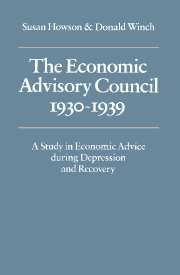6 - CONCLUSIONS
Published online by Cambridge University Press: 07 October 2011
Summary
We hope that this study of the Economic Advisory Council and its committees, together with the documents reprinted below, will enable a more balanced judgment to be made on the successes and failures of this pioneering advisory institution in a field which has been more closely cultivated since the second world war. Our own conclusions on specific episodes will be apparent by now, but it also seems useful to draw attention to some of the wider issues raised by the experience of the Economic Advisory Council.
In Chapter 2 we pointed out that the Council, as originally constituted, brought together two sets of ideas which had emerged in post-1918 discussions of economic policy formation. These we labelled ‘technocratic’ and ‘representative’ respectively. The conflation of these two sets of ideas was a major cause of the Council's failure. The representative principle was recognised in heavily diluted form: a mixture of businessmen and trade union leaders chosen by the Prime Minister was a token move in this direction. When combined with the more technocratic apparatus of an economic staff, it resulted in a body which was open to all the criticisms made by its more activist members at the time, especially by those who were led to expect that it would be an ‘engine for action’. It did not come near to satisfying the proponents of a Council of Industry or National Economic Council capable of authoritative deliberation on questions of industrial relations and economic policy.
- Type
- Chapter
- Information
- The Economic Advisory Council, 1930–1939A Study in Economic Advice during Depression and Recovery, pp. 154 - 353Publisher: Cambridge University PressPrint publication year: 1977
- 1
- Cited by



